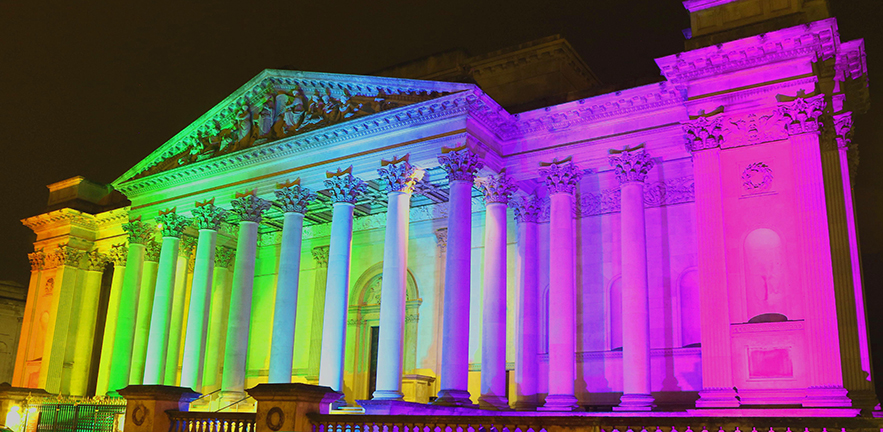Advances in optics means that the 21st century may rely as much upon photonics as the 20th century relied upon electronics, and this development is closely intertwined with social innovation.


In fields ranging from renewable energy and sustainable development to health, lighting technologies can help us overcome some of these challenges facing our planet – so it’s worth exploring some of the British companies, many of them based in Cambridge, which are playing a role.
One of the most exciting areas of innovation lies not just in the low power consumption and high durability of technologies such as light-emitting diodes (LEDs) and organic LEDs (OLEDs), but also in the fact that light sources can now be embedded into ordinary objects to be controlled through microchips. These microchips can have sensing capabilities linking lighting solutions to the complexity of human life.
This means that light and lighting technologies are at the heart of the Internet of Things (IoT), as ARM, a Cambridge-based world leader in microprocessor, knows well, having worked since 2013 on a project with lighting technology firm Enlight, which is based not far away in the county of Norfolk. The IoT uses efficient and high-quality LED lighting that can communicate and interact with its environment, as well as with the users that it serves.
Light is also employed in several technologies we use daily to connect with friends and family, and for business, including online video conferencing. Undoubtedly, fiber-optic communications have revolutionised the way people interact in the 21st century, allowing us to connect distant parts of the world in ways that save transportation costs while not damaging the environment.
One may ask: but isn’t the main function of lighting to provide us with light to overcome darkness? Perhaps not anymore, because lighting will not simply illuminate a social space but be an integral part of the very social arrangements that it previously only made clearly visible in darkness or dimness.
Paviom, a UK lighting innovator knows this well. The firm promotes lighting strategies in urban environments to create or contribute to a city’s identity, engender civic pride and a sense of ownership among its residents, and create a lasting impression to visitors. Further to research at the HHCD (Helen Hamlyn Centre for Design) Paviom & HHCD created an innovative tubular lighting solution which works with generic clamp systems that allows for a practical light source to be situated virtually anywhere and to almost any surface, offering nodes of lighting in areas deprived of illumination. This product is a low cost solution and makes a real difference to areas where street lighting is lacking. It is a brilliant case of social innovation. Paviom together with Original Breed brought this innovative solution to market.

When talking about light, it comes natural to think about the sun and solar energy. The renewable energy sector is an ever-expanding one where we find some of the best case studies on social innovation. For instance, Cambridge-based Eight19 creates printed plastic solar films to charge electrical appliances in developing countries, while Cambridge-based Polysolar produces transparent photovoltaic glass that can be incorporated in buildings or car parks, generating energy for these spaces.
Another product I have recently come across is Spark, designed to bring light to parts of the world with no electricity; this beautifully simple gadget is a musical instrument that generates enough kinetic energy to power a light. In the words of its founder, Sudha Kheterpal, percussionist for the band Faithless: “At its heart this is a project about interdependence and togetherness”.
Touching on the cultural aspect of lighting, it’s important to mention the social role of light festivals taking place all over the world. A light festival is an event aimed at celebrating the importance of light via light installations and light-based shows. I’m biased in this regard, having started the first Cambridge light festival in 2012: e-Luminate Cambridge. These events are growing in popularity and, thanks to LED low energy revolution, artists are experimenting more and more with the medium of light. These events attract thousands of visitors to enjoy cities lit up in the cold dark winter nights.

Light profoundly affects us in so many ways we forget that on the most fundamental level, it is the very process of photosynthesis that enables life on Earth. Indeed, light is fundamental in agriculture and the use of LED technologies is now well established in greenhouses. A new trend is now transforming the way we cultivate. A company called Growing Underground builds vegetable gardens in unused underground spaces in London, including a 33-metre stretch under a busy section of Clapham in south London.
With all this excitement around photonics, it comes as no surprise that UNESCO proclaimed 2015 the International Year of Light and Lighting Technologies. At the official Opening Ceremony in Paris, which I was lucky enough to attend, Ban Ki Moon said in his message: “As we strive to end poverty and promote shared prosperity, light technologies offer practical solutions to global challenges… They are particularly important in advancing progress towards achieving the future global sustainable development goals and addressing climate change.”
To find out more about social innovation in photonics, please visit our next event, the e-Luminate Light Lab, part of the Cambridge Festival of Ideas, on Saturday 31st October. We will exhibit some of the technologies described in this article and much more. For further details, please visit the Festival of Ideas website
Alessandra Caggiano is Co-Founder of the e-Luminate Foundation which was part of the first cohort on the Accelerate Cambridge programme in 2013.
Image credit
Main Image | Credit: Richard Marsham


Leave a Reply